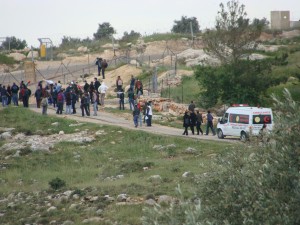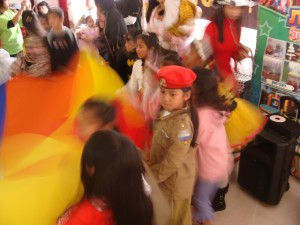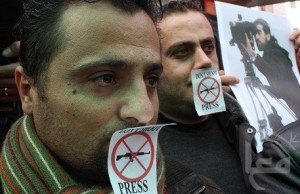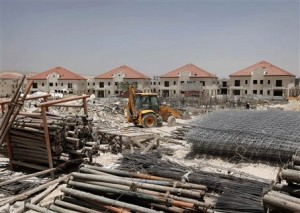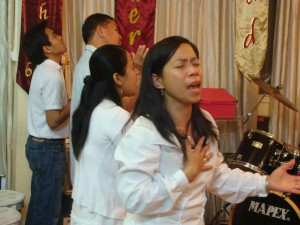 The Jerusalem Post, April 30, 2010
The Jerusalem Post, April 30, 2010
The National, May 17, 2010
Nearly half of Ruby Austria’s 150 congregants have disappeared since the Oz Unit, a strong arm of the immigration police, took to the streets in July. Thousands of foreign workers have left the country out of fear. Hundreds have been deported.
In recent months, many churches that minister to migrant laborers have seen their numbers grow so thin that they’ve been forced to close. But Austria is busier than ever. She receives a constant stream of congregants worried about Israel’s plan to expel some 1200 minors, along with their parents, at the end of the school year.
Austria, who also runs a kindergarten for children of foreign workers, often finds herself consoling mothers and fathers when they pick up their kids. “They come to me and cry—what will happen, what will be? The mothers have fear all the time, the [sense of] being threatened,” she says. “The moms are harassed and interrogated. [The Oz Unit] takes them in the [police] van and drives them around.”
“Even if you don’t tell the children, they feel what the mother feels,” Austria continues. “When the Oz Unit first came, the children were crying all the time, some weren’t eating, some stopped speaking. They were very fearful. It was very hard…”
Austria says that it’s important to her to “be strong” for the families who need support right now. But it’s hard. Austria, 36, is also an illegal resident. She, along with her husband and their seven-year-old daughter, faces deportation to the Philippines.
Austria, who holds a college degree in nursing, arrived in Israel 13 years ago to work as a caregiver. Her employer died and her visa ended in 2002, just before a major wave of arrests and expulsions began. Israel targeted men, in hopes of encouraging families to return to their countries of origin. Husbands and male pastors were deported; giving rise to single moms and women at the pulpit.
The difficulties facing the community were inspiration for Austria to become a pastor. Despite her illegal status, she began attending the Bible Institute of Jerusalem and, after completing her studies, was ordained as a minister.
Austria isn’t your typical Christian pastor, however. Her approach to religion is deeply informed by Judaism. Austria’s pulpit is adorned with a hannukiah. She dons silver earrings of a menorah and a fish, a symbol of Christianity, joined together by a Star of David. She touches the jewelry and says, “This means that the Jew and the Christian are one.”
Austria incorporates Hebrew into her services, makes Kiddush, and lights Shabbat candles. And some members of her congregation wear talit during prayers. It helps them “feel the presence of God,” Austria explains.
As is true of many Christians, particularly Filipinos, Austria feels a strong connection to Israel. “We have one God, because we [Christians] also believe in the [Old Testament]. We thank you—thank Israel—for giving us the Bible. If not, we would still be worshipping the stars, the woods, the sun,” she says.
But when she considers the way the government treats migrant laborers, she is fraught with “great friction, emotionally.”
Today, Israel is home to approximately 300,000 migrant laborers, primarily from the Philippines, Thailand, China, India, Nepal, and Sri Lanka, with the Filipino community making up the largest group. It is estimated that 250,000 of the workers are illegal. A majority arrived legally but became illegal after overstaying or losing their visas.
Due to the plans to deport Israeli-born children, the current crackdown has drawn tremendous criticism. And, pointing to Prime Minister Netanyahu’s claims that foreign workers threaten the Jewish character of the state, some observers have called the campaign racist.
Sabine Haddad, spokesperson for the Ministry of the Interior, denied that moves against migrant laborers are related to preserving the Jewish character of the state. “There is no problem with legal workers,” she said. The Oz Unit is simply trying to enforce the law. “Our unit is doing what the government says.”
Haddad emphasized that the Oz Unit is not currently arresting or deporting children or their parents. A special committee is convening to consider the deportation of families, Haddad said. If the plan is finalized, it represents a move against illegal residents, not against children, parents, or foreign workers in general.
Speaking to The Jerusalem Post recently, Tamar Shwartz of the NGO Mesila—Aid and Information Center for the Foreign Community—remarked that recent events have “threatened the social network” of migrant laborers and refugees.
While children have been particularly affected by the crackdown, Shwartz said the whole community “is very much weakened by the activities of the immigration police…. Everything that makes this community strong is a blessing.”
In the midst of the crisis, Austria offers weekend services as well as impromptu prayer sessions. When the church is occupied by the kindergarten, Austria ministers upstairs on the roof. “Almost every day, there are men and women stopping by to pray,” she says. “Almost every day, my cell phone is full of text and [voicemail]. What do the messages say? “Please pray for me.”
When someone is in urgent need of spiritual guidance, Austria grabs child-sized chairs from the gan and heads to the roof, an urban sanctuary. Although it’s close to the Central Bus Station, it’s quiet and still up here.
But sometimes, the Oz Unit is in sight below.
Austria’s church is not always a safe haven. About a year ago immigration police showed up, without a warrant. “They thought I was hiding someone here,” she says. “They searched all the rooms and the roof.” The police also threatened to shut down her kindergarten.
In December, the Oz Unit conducted a similar raid on a South Tel Aviv church popular with African asylum seekers—despite the fact that protocol forbids immigration police from entering houses of worship.
Still, the women pastors see the church as a place to hit back.
On a recent weeknight, a large group of foreign workers and African refugees gathered in Christ the Redeemer Assembly, where Filipina Marife Adriano is a pastor. But they weren’t there for a sermon. Congregants were participating in a seminar titled “Know your Rights,” which included speakers from local human rights organizations.
Sitting in the audience, Adriano, 38, remarks, “Church is also a way to help people, to communicate… We can organize something for [migrant laborers and asylum seekers], give counseling to the people.” She estimates that since the Oz Unit has begun its work, however, about half of the ministries frequented by foreign workers have closed.
But Adriano’s work is not only in the church. “It’s also outside. If people have questions, hear rumors, they are calling.” In turn, Adriano contacts NGOs and does her best to get more information for her congregants. She is also active with Israeli Children—a grassroots movement that is fighting the deportation of minors who lack legal status.
Although Adriano and her nine-year-old son received permanent residency in 2006, and are safe from expulsion, she understands the fear plaguing the community now. “When they started deporting the first time [in 2002], I decided to go home,” Adriano, a single mother, recalls. “My pastor said ‘Pray and fast and see what the Holy Spirit will lead you to do.’ I decided not to go home. I felt there is something more I have to do here in Israel.”
Shortly after this epiphany, Adriano began to lead a bible study in her South Tel Aviv apartment. She gradually became more active and in 2007, she was ordained as a minister by a pastor visiting from the Philippines.
“I feel like I have freedom here [in the church],” Adriano says. She hopes that faith will bring the same feeling to those who seek her ministries.
Like Austria, Adriano counsels her congregants spiritually and emotionally around the clock. “Their problem is your problem,” she says. “As a minister, a pastor, you have to sacrifice yourself.”
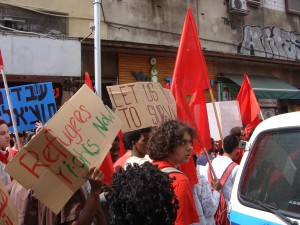 Al Jazeera English, May 1, 2010
Al Jazeera English, May 1, 2010
